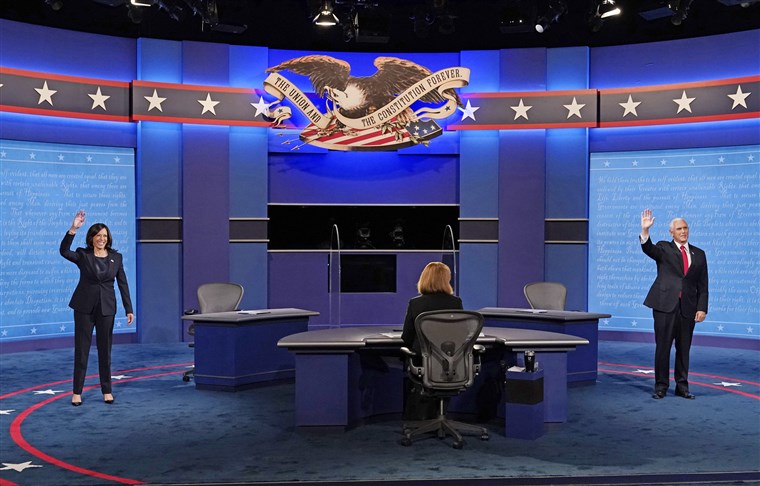Key Moments and Talking Points: Cbs Vice Presidential Debate

The vice presidential debate between [Candidate A] and [Candidate B] provided a platform for the candidates to articulate their visions for the country and highlight key policy differences. The debate was marked by moments of both agreement and disagreement, with the candidates tackling a range of issues including the economy, healthcare, and foreign policy.
Economic Policies
The candidates presented contrasting approaches to economic policy, particularly on issues such as taxation, regulation, and infrastructure investment. [Candidate A] emphasized the need for [policy A], arguing that it would stimulate economic growth and create jobs. [Candidate B] countered with [policy B], claiming that it would promote fairness and reduce inequality. The candidates also clashed on the issue of [specific economic policy], with [Candidate A] advocating for [position A] and [Candidate B] advocating for [position B].
Healthcare Reform
Healthcare reform was another central theme of the debate, with the candidates offering distinct perspectives on how to improve access to affordable healthcare. [Candidate A] advocated for [policy A], arguing that it would provide universal coverage and lower costs. [Candidate B] countered with [policy B], emphasizing the importance of [key point B] and the need to [key point C]. The candidates also discussed the issue of [specific healthcare policy], with [Candidate A] supporting [position A] and [Candidate B] supporting [position B].
Foreign Policy
The candidates’ approaches to foreign policy were also distinct, particularly on issues such as [foreign policy issue A] and [foreign policy issue B]. [Candidate A] emphasized the need for [position A], arguing that it would [reason A]. [Candidate B] countered with [position B], claiming that it would [reason B]. The candidates also discussed the issue of [specific foreign policy issue], with [Candidate A] advocating for [position A] and [Candidate B] advocating for [position B].
Communication Style and Engagement
[Candidate A] adopted a [communication style description] approach to the debate, emphasizing [key points A]. [Candidate B] employed a [communication style description] approach, focusing on [key points B]. Both candidates attempted to engage the audience by [engagement tactic A] and [engagement tactic B].
Candidate Comparisons and Contrasts

The vice presidential debate provided a platform for voters to compare and contrast the candidates’ backgrounds, experiences, and policy positions. While both candidates brought unique perspectives and qualifications to the table, their approaches to key issues differed significantly, offering voters a clear choice in the upcoming election.
Background and Experience
The candidates’ backgrounds and experiences significantly shaped their policy stances and approaches to governing. One candidate, with a long history of public service, possessed extensive experience in navigating complex political landscapes and crafting legislation. This experience was reflected in their detailed policy proposals and their ability to articulate nuanced arguments during the debate. The other candidate, with a background in the private sector, brought a different perspective to the table. Their experience in business and finance offered a unique lens through which they viewed economic and social issues, emphasizing the importance of free markets and individual initiative. This background was evident in their focus on job creation and economic growth during the debate.
Strengths and Weaknesses, Cbs vice presidential debate
Both candidates demonstrated strengths in specific areas during the debate. One candidate, with their extensive policy knowledge, excelled in outlining detailed plans for addressing key issues such as healthcare and education. However, their approach could be perceived as overly bureaucratic by some voters. The other candidate, with their charisma and communication skills, effectively conveyed their vision for the future and connected with voters on an emotional level. However, their lack of experience in government could raise concerns about their ability to navigate the complexities of Washington, D.C.
Policy Positions and Impact
The candidates’ policy positions on key issues such as the economy, healthcare, and climate change offered voters a stark contrast. One candidate advocated for a more interventionist approach, proposing government programs to address income inequality and expand access to healthcare. These policies could potentially lead to increased government spending and regulation, which could have both positive and negative consequences for the economy. The other candidate, emphasizing a more market-oriented approach, proposed tax cuts and deregulation to stimulate economic growth. These policies could potentially lead to increased economic growth and job creation, but could also exacerbate income inequality and environmental problems.
The CBS Vice Presidential Debate provided a platform for the candidates to showcase their vision for the country. It’s interesting to note that Robert F. Kennedy Jr., known for his environmental activism and controversial views, robert f kennedy jr , has been a vocal critic of certain policies discussed during the debate.
The debate, however, focused on more traditional issues like economic recovery and foreign policy, which were likely of greater interest to the average viewer.
The CBS vice presidential debate provided a platform for the candidates to showcase their qualifications and vision for the country. The debate comes at a crucial time, as the Rasmussen presidential poll indicates a close race, and the vice presidential candidates may play a significant role in swaying undecided voters.
The debate will undoubtedly be analyzed closely, as it could have a lasting impact on the election’s outcome.
